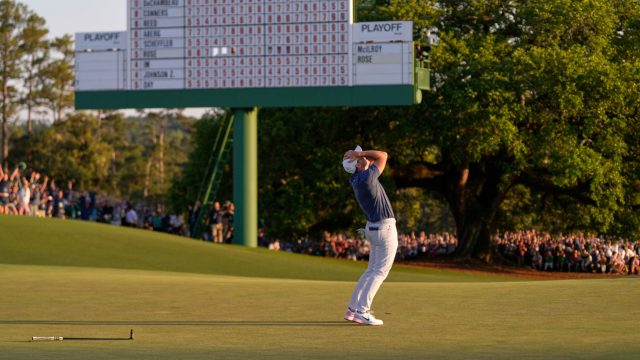
It’s the failing that gets you.
Professional golf — or any sport at the highest level — is so difficult, and yet we are constantly fooled by how easy the best make it all look so often.
Tiger Woods is one of the greatest athletes ever not only because of the nearly incomparable resume, but because at his peak you knew how the story would end. His wins were movies you could watch time and again, providing plenty of drama, along with a payoff.
Michael Jordan? Same thing. Wayne Gretzky when the Edmonton Oilers were at full sail. Barry Bonds when he was leaving the best pitchers weak with fear. Shohei Ohtani now.
Rory McIlroy always has had all the ability needed to walk amongst the legends of golf, maybe of all sports. He was tagged a prodigy when he was still a curly-haired teenager. He won four majors by the time he was 25, joining Woods and Jack Nicklaus as the youngest ever to do that.
At age 35 with a gym-honed physique and greying temples, there’s been no drop-off. His tee shot on the first hole on Saturday rolled out 371 yards. His fluid power is almost unmatched in the history of the game. He’s won 19 PGA Tour events — a hall-of-fame career for most — since he won his fourth major championship back in 2014. He’s won twice this year alone.
But unlike so many of the greats, McIlroy has had a special talent for tripping over his shoelaces in the highest-profile events at the worst possible times.
His triple bogey on the 10th hole at Augusta on his way to a final-round 80 in 2011 after starting with a four-shot lead was a result so heartbreaking then that he ended up a puddle of 21-year-old tears.
The heartbreaks were just getting started. McIlroy had played 38 major championships since his last title before putting his tee in the ground Sunday with a two-shot lead and a chance to become one of six players to win golf’s career Grand Slam — wins at each of the four major championships.
It didn’t look good when McIlroy put his tee shot into the same bunker Sunday that he flew over comfortably the day before and then did it again on the second hole. He was obviously tight. By the time he walked off the second green, his two-shot lead had turned into a one-shot deficit.
And so the day went.
The rest of us can’t relate to the all-time greats because they don’t ever seem to make mistakes or cave to the pressure or — I hate the word, but it fits — choke.
Who among us hasn’t tossed away a good round of golf with a careless double bogey? None among us, is the answer, and that’s just golf. When it gets to the big-picture stuff, most of us are struggling along with more bogeys than pars. It’s the normal person’s lot.
But McIlroy is not one of us and yet the Irishman made two doubles on Sunday and four in the tournament, all of them due strictly to pilot error with no turbulence on the radar. No one has ever won a Masters playing golf like that, which is to say, playing golf like you and me.
Case in point: hitting a routine wedge from 89-odd yards on the 13th hole to 78 yards — just far enough to hit the edge of the green and bounce back into Rae’s Creek and make what seemed like one double bogey too many. Just hand the tournament away, why don’t you.
It made for great theatre, if you find watching sports celebrities fall apart so completely that the idea of them living to fight again made everyone uncomfortable.
The way McIlroy was going — had he ended up losing — watching him come close and fail again couldn’t possibly be enjoyable this time. He was on the verge of cancelling himself. Who wants to watch a bird with a broken wing?
It was like McIlroy was holding up a mirror to the rest of us so we could see ourselves and all our short-comings and chances not taken, and opportunities fumbled. Like, we get it. It was relatable in the worst way. Then again, McIlroy got divorced and un-divorced in the space of about a month last summer, so who knows emotional roller-coasters better?
What made Sunday a Masters unlike any other was that every time McIlroy tripped, seemingly fatally, he responded by grabbing on a thin branch as he fell down the face of the cliff, somehow pulling himself back to firm ground and hitting the shot of his life.
He did this three times in the space of four holes.
His approach on the par-5 15th — a slinging 7-iron from under a tree that rolled to six feet — was the kind of magical, under-pressure shot that would be a career highlight for most. McIlroy was just getting warmed up.
Having missed a makeable birdie putt on 16, he gave himself another chance when he chased after another iron to the green from the 17th fairway, exhorting it all the way — “go, go, go, go, go” — until it rolled to two feet. Another iconic shot.
He cashed the putt, took a one-shot lead and now, finally, after four hours of downs and ups, brilliance and boneheadedness, the tournament was going to be his, and all the glory that had been denied him so long.
And then he stuffed a 120-yard wedge into the bunker on 18 — the kind of shot a player of his level gets somewhere on the green nine of 10 times without the pressure of the whole world watching. Naturally he missed the five-foot par putt and, there it was again: having failed to dry his hands after washing them, the trophy slipped and clattered to the floor.
If McIlroy had simply gone No Mas and walked off into the Augusta sunset, who would have blamed him? Why put yourself through this kind of torture?
But that’s golf, and so many other things we do in life and love, often against our best instincts: we somehow fool ourselves into thinking it will get better. Next time will be different.
The only way to find out is to keep going, and so McIlroy made his way back to the 18th tee for a sudden-death playoff with Justin Rose — a story of perseverance in his own right, trying to win his first Green Jacket at 44 years old and in his 20th try.
Another meteoric drive from McIlroy left almost the exact same shot as he shoved in the bunker not even 15 minutes earlier. This time he executed perfectly, and it spun back close to the hole.
A four-foot putt? What could go wrong?
Oh right, McIlroy missed putts from similar distance on his way to fumbling away the U.S. Open last summer, not to mention the putts he’d missed at 15, 16 and 18 in the previous hour that could have won him the Masters before the playoff.
Have you ever had voices in your head screaming so loud you can’t move? Your hands feeling like someone else’s feet?
I can’t say McIlroy did or didn’t on Sunday, as a crowd of thousands live at Augusta, and millions all over the world, watched wondering if he was going to cough up one more hairball, like the catcher who can block a 99-m.p.h. fastball in the dirt, but air-mails his throw to the pitcher, allowing the runner to score from third anyway. It was watching-through-your-fingers kind of stuff.
Either McIlroy quieted those voices or was able to ignore them, but the putt of his life rolled in true.
And for a moment, McIlroy was who we would all love to be, but so rarely are: the person who can slay their own demons and quell their own doubts. Who can triumph one more time than they fail. Who only wants to go home to celebrate with his family, finally having his finest moment.
From that perspective the tears made perfect sense, even the ones rolling down your own cheeks from the comfort of your couch, dinner waiting.






